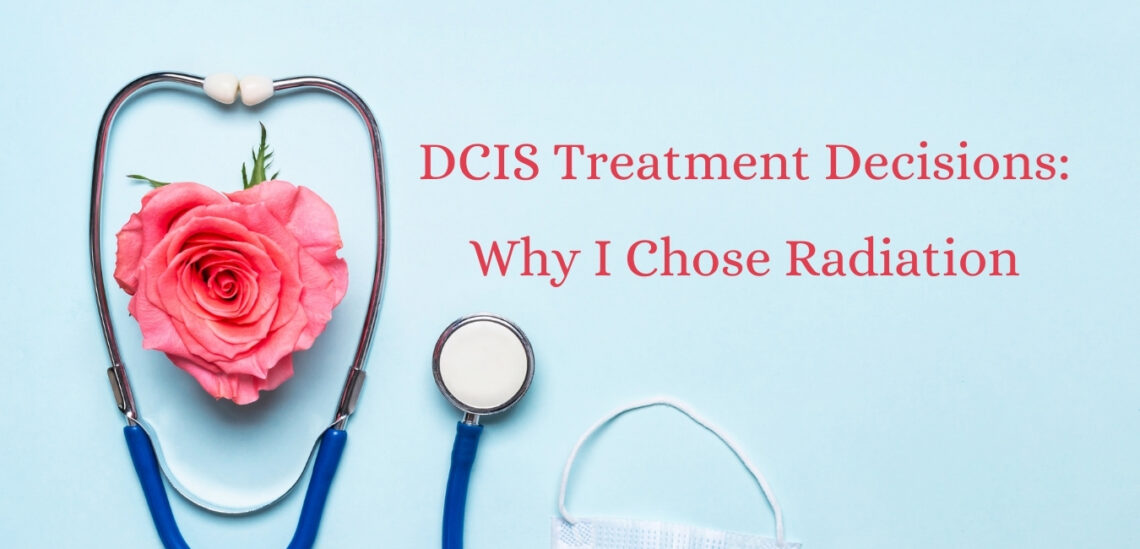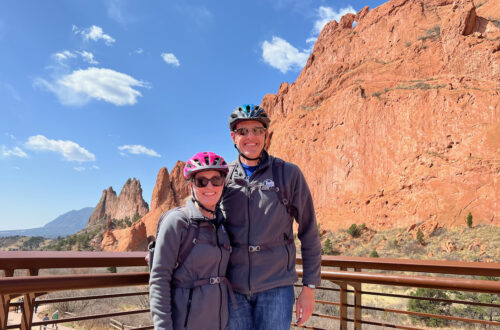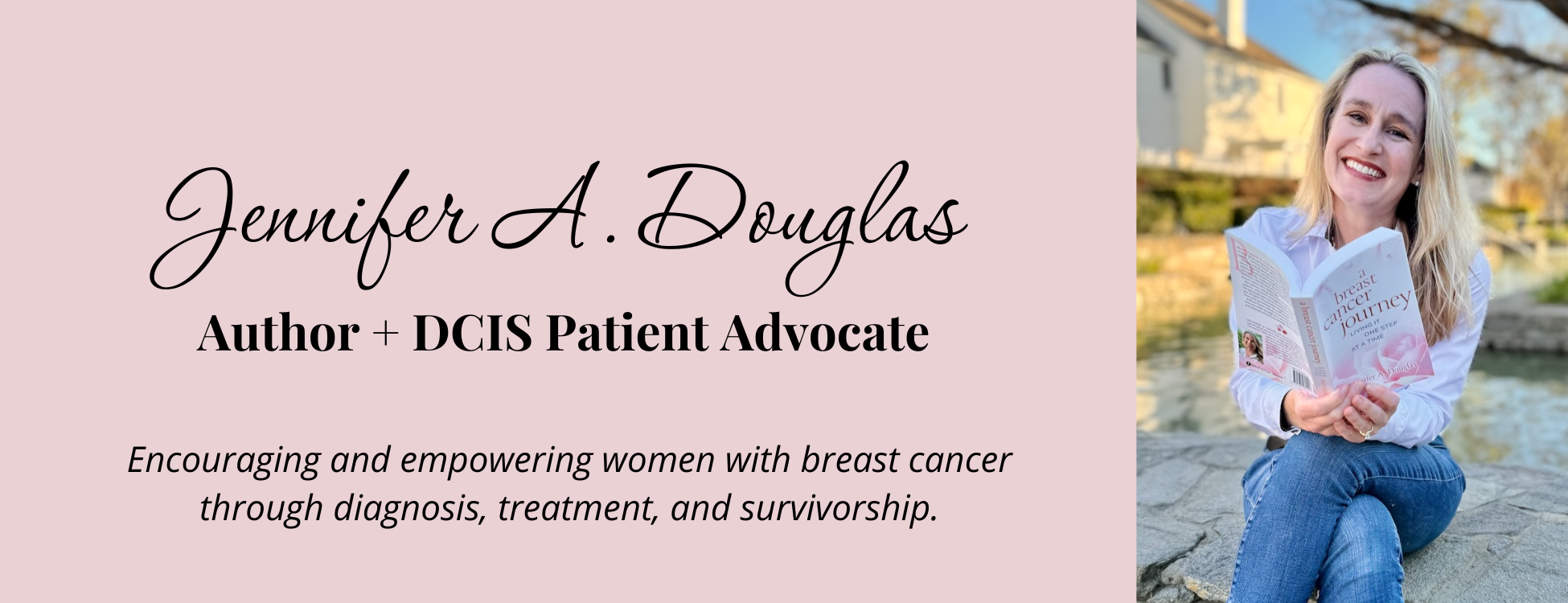
DCIS Treatment Decisions: Radiation After My Lumpectomy
After my lumpectomy in the Fall of 2019, I decided to undergo radiation treatment. After consulting with my breast cancer medical team and getting my questions answered, I felt very comfortable with my treatment decision.
Note: I am not a medical professional. Please consult your medical team to make treatment decisions. Also, please understand my disclaimer regarding the information shared on this website.
It can be frightening to face a treatment that involves irradiating part of your body. I had significant anxiety before and during radiation. However, I am thankful that I decided to undergo the therapy, especially since I could not continue taking the hormone-reducing medicine I was prescribed. You can read about my experience with tamoxifen here.
Transfer to Oncology
Once my lumpectomy was completed, and my breast surgeon was done with the surgical follow-ups, I was referred to my medical oncologist. During that appointment, we went over my post-surgical treatment options. He recommended that I consider radiation and also taking tamoxifen to reduce the risk of recurrence.
I asked him where I could get radiation done nearby, and he mentioned that I would need to be referred out of the current medical group to another that had a radiation office in town. This referral was essential to get because radiation is a daily treatment. If there was a nearby option, I was going to take advantage of that.
If you are not in a metro area, you may need to travel for quite some distance to your treatment. Some organizations have resources to help make that easier on cancer patients. The American Cancer Society has a list of some resources that might help make this easier for you.
Precision Diagnostic Tests to Determine Radiation Benefit
A few tests have been developed to help patients decide if radiation treatment would be beneficial for them. These are not always run as standard practice, so if you would like these done on your samples, make sure to ask your oncologist.
Oncotype DCIS: The traditional Oncotype is a standard test run to help patients and oncologists determine if Chemotherapy is warranted. They also have a test called OncotypeDCIS that can be run for DCIS patients, which will run a genomic test on your sample and then produce a relative recurrence rate. This recurrence rate is based on treatment with surgery alone.
I asked my oncologist to order the test for me during my initial appointment with him. I was curious to see what my risk of recurrence was. My test came back with a 10-year risk of local breast cancer recurrence at 12% and a 6% risk of invasive cancer. These were based on treatment with surgery alone.
I made an independent decision to have radiation before receiving these results, and I’ll explain why later on in the post.
DCISionRT : The purpose of the DCISionRT test is to help patients and clinicians decide if Radiation Therapy would be of specific benefit to them based on their pathology. This test also looks at the genetic components of the DCIS tumor sample and extrapolates the relative benefit of radiation. The test then communicates to the patient and provider the relative level of risk of local recurrence in 10 years.
I wasn’t aware of the DCISionRT test during my decision-making process and so I wasn’t able to use it to help me make a decision. In 2024, I began a patient advocacy relationship with PreludeDX, and they offered to run the DCISionRT test on my sample. You can read my reflections and results in this post.
While I was waiting for my OncotypeDCIS test results, I decided to make an appointment with the radiation oncologist.
Radiation Oncologist
I had no idea what to expect when I went into my radiation consultation appointment. I was meeting with an oncologist outside of my medical group, so I knew that I would need to start over from the beginning with this provider.
I came into the appointment prepared with a list of the side effects of radiation that I had read about and had highlighted the ones that I was most fearful of. For me, that was the risk of late-term nerve damage that occurred very rarely after treatment. I have included a link to an article that details some of the possible side effects of radiation.
I was ready to ask questions and try to decide if this treatment was right for me.
My radiation oncologist came into the consultation room and seemed to know me already. She had reviewed my case thoroughly and gave me a verbatim account of my diagnostic journey and surgery. She did all of this without looking at her notes.
I was amazed. The radiation oncologist knew my story and was ready to discuss the treatment and side effects with me. When I asked her about my fear of nerve damage, she acknowledged that it was a possible side effect. However, in her radiation oncology career, she had never had a patient with that particular issue.
We spent about an hour talking about my concerns and her recommendations. I left the appointment clear about my decision to undergo whole breast radiation, even before I had the results of my OncotypeDCIS score.
Why I Decided To Do Radiation
Age: I was 41 at diagnosis. When I looked at the rates of recurrence, they only went out for ten years. I wanted to see 40-year recurrence rates, but those are not available yet! When I discussed my concerns about radiation with the radiation oncologist, she recommended treatment for me because of my age. If I were older, I would have likely skipped the therapy. But, I would love to live another 40 years, so if I could reduce my recurrence rate by doing this treatment, that would be great.
Surgery Choice: I chose to have a lumpectomy, so there was still breast tissue on my right that might be harboring tiny bits of DCIS. Current imaging is limited and may not see all of the microscopic areas of DCIS that might be there. My DCIS showed up on mammography in between my annual mammograms. Another spot could be there, but it wasn’t large enough to be viewable on imaging. By adding radiation, I hoped to eliminate any “rogue cells” that might have taken up residence somewhere else in my breast.
Mental Peace: I wanted to close out this chapter of DCIS by being confident that I had done everything reasonable to remove the cancer. DCIS was a massive disruption to our lives. It was anxiety-producing for me, and challenging for my husband and kids. I wanted to hit this DCIS with as many weapons as I could.
By pairing radiation with the lumpectomy, I felt confident that I was doing as much as I could to deal with this diagnosis. My surgery was on 10/28, and I finished radiation on 12/23. It was two months of challenging treatment and recovery, but I felt like it was worth it. The lumpectomy took out the visible cancer, and the radiation took care of the potential “invisible cells” imaging couldn’t see. Now, this didn’t address the risk on my other side, but I felt mental peace when I thought about my treatment choices.
Radiation treatment was hard because I was fatigued, burned, and sore. But I am so happy I did it! The radiation team was caring, sensitive, and altogether remarkable, from the oncologists to the techs. They took such good care of me during and after the treatment. I made sure to rest and hydrate my skin as much as possible. I’m over a year out of radiation, and my skin is completely healed.
It can be challenging to make treatment decisions with a breast cancer diagnosis. We are constantly weighing the treatments with the side effects. I hope that in reading through my decision-making process, you are better able to sort through treatment choices for yourself.
Jennifer Douglas
Jennifer Douglas is an author, patient advocate, and DCIS breast cancer survivor. After navigating her own breast cancer journey in 2019, she began writing and encouraging others who were newly diagnosed. Her resources include her book, "A Breast Cancer Journey: Living It One Step at a Time," and her online support course, "Encourage: Breast Cancer and Beyond." Jennifer also actively supports patients through her online presence and direct involvement in communities and support groups, offering guidance and encouragement every step of the way.


You May Also Like

Recovery is a Process, Not an Event
May 24, 2022
Breast Imaging Focus: What is a Screening Mammogram?
February 4, 2022

4 Comments
Cory Dunn
Thank you Jennifer for sharing your knowledge and experience! So delighted you are doing well after treatment. Please reach out if you ever need further information about DCISionRT benefits for patients diagnosed with DCIS.
Jennifer Douglas
I will do that! I found out about DCISionRT through another patient and found the test to be quite valuable. Although I didn’t use it, I did enjoy learning more about it. I hope it can be an effective tool for many who are trying to figure out if radiation is critical for them.
Christy
Hi Jennifer,
Thank you for sharing your experience with DCIS. In March I was also diagnosed with DCIS, Stage 0 breast cancer. On April 15th I had a lumpectomy. This morning I am returning to surgery! Even though my margins are free of cancer, my oncologist was not able to get the 2mm clearance she wanted in one area. I will be 64 on Sunday!
I will most likely do radiation. Unsure if I will do the hormone blockers. My experience has been extremely positive!
Happy you are doing well and thank you for sharing your journey!!
Jennifer Douglas
I hope all goes well today for your second surgery. Wishing you a smooth recovery and a very happy birthday. So glad your experiences have been positive to far. ((Hugs)) and best wishes on this next part of the process.